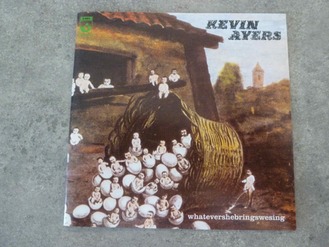Tuesday, 16 April 2013

While The Whole World didn’t last, and, on the surface you wouldn’t have expected it to, David Bedford and Mike Oldfield stayed in the picture for the 1971 sessions that produced Kevin Ayers’ third, and most acclaimed album. In between Shooting at the Moon and Whatevershebringswesing, Ayers had been gigging across Europe with Daevid Allen's band, which explains the presence of saxophonist Didier Malherbe after the departure of Lol Coxhill,
Having worked through Joy of a Toy and Shooting at the Moon the collision of disparate styles hardly comes as a surprise, but here the different styles work together better than they had in the past, from the symphonic notes that start There is Loving > Among Us > There is Loving through to the end of the Didier Malherbe flute solo on Lullaby, with plenty of territory covered in between.
The Whatever sessions started before the demise of The Whole World, which accounts for the David Bedford writing credit (Among Us) stuck in the middle of the two slices of Ayers’ There Is Loving. There’s a fair slice of similar vibe to Pink Floyd’s Atom Heart Mother here, in Bedford’s symphonic, brass heavy orchestral arrangement, but after an avowedly experimental beginning Margaret turns out to be a rather straightforward ballad, intimate in a perfectly romantic setting with understated orchestration.
From there light and shade factors and what comes next probably explain the lightweight New Orleans vibe that runs through Oh My, three minutes of lightweight before the sombre introduction to Song from the Bottom of a Well, which looks back to The Soft Machine’s Why Are We Sleeping? and forwards to Dr. Dream, four and a half minutes marries an experimental arrangement with Oldfield to the fore with a cryptic lyric Intoned in a creepy voice that sounds like it’s coming from a well, tomb or grave, guttural and brimming with foreboding over a barrage of jarring sound effects and dissonant elements.